342297
2,7-Dibromofluorene
97%
Se connecterpour consulter vos tarifs contractuels et ceux de votre entreprise/organisme
About This Item
Formule empirique (notation de Hill):
C13H8Br2
Numéro CAS:
Poids moléculaire :
324.01
Numéro MDL:
Code UNSPSC :
12352100
ID de substance PubChem :
Nomenclature NACRES :
NA.22
Produits recommandés
Niveau de qualité
Essai
97%
Pf
164-166 °C (lit.)
Groupe fonctionnel
bromo
Chaîne SMILES
Brc1ccc-2c(Cc3cc(Br)ccc-23)c1
InChI
1S/C13H8Br2/c14-10-1-3-12-8(6-10)5-9-7-11(15)2-4-13(9)12/h1-4,6-7H,5H2
Clé InChI
AVXFJPFSWLMKSG-UHFFFAOYSA-N
Catégories apparentées
Description générale
2,7-Dibromofluorene is a halogenated polycyclic aromatic compound and its vapour pressure has been measured using the Knudsen effusion method.
Application
2,7-Dibromofluorene was used as a template for the N-carbazole capped oligofluorenes which show potential as hole-transporting materials for organic light emitting devices (OLEDs). It may be used in the synthesis of conjugated polymer, poly[9,9′-bis(6′′-N,N,N-trimethylammonium)hexyl)fluorene-co-alt-4,7-(2,1,3-benzothiadiazole) dibromide] (PFBT), used in label-free DNA microarrays. It was used in the preparartion of blue photoluminescent unsymmetrically substituted polyfluorene. It was also used in the preparation of 2,7-dibromofluorene monomers containing benzyl ether dendrons (generations 1, 2 and 3) in the 9,9′-position of the fluorene ring, such as:
- 9,9-bis[(3,5-bis(benzyloxy)benzyloxy)methyl]-2,7-dibromofluorene
- 9,9-bis[(3,5-bis(3,5-bis(benzyloxy)benzyloxy)benzyloxy)-methyl] 2,7-dibromo-fluorene
- 9,9-bis[(3,5-bis(3,5-bis(3,5-bis(benzyloxy)benzyloxy)benzyloxy) benzyloxy)-methyl]-2,7-dibromofluorene
Mention d'avertissement
Warning
Mentions de danger
Conseils de prudence
Classification des risques
Eye Irrit. 2 - Skin Irrit. 2 - STOT SE 3
Organes cibles
Respiratory system
Code de la classe de stockage
11 - Combustible Solids
Classe de danger pour l'eau (WGK)
WGK 3
Point d'éclair (°F)
Not applicable
Point d'éclair (°C)
Not applicable
Équipement de protection individuelle
dust mask type N95 (US), Eyeshields, Gloves
Faites votre choix parmi les versions les plus récentes :
Déjà en possession de ce produit ?
Retrouvez la documentation relative aux produits que vous avez récemment achetés dans la Bibliothèque de documents.
H Z Tang et al.
Chemical communications (Cambridge, England), (23)(23), 2426-2427 (2002-09-25)
The first unsymmetrically substituted polyfluorene bearing a bulky poly(benzyl ether) dendron and less bulky 3,6-dioxaoctyl groups in the 9-position was designed and synthesized, which gives almost a pure bluish photoluminescence with negligible weak greenish excimer emission around 520 nm even
Jinxia Fu et al.
Environmental toxicology and chemistry, 31(3), 486-493 (2011-12-06)
Knowledge of vapor pressure of organic pollutants is essential in predicting their fate and transport in the environment. In the present study, the vapor pressures of 12 halogenated polycyclic aromatic compounds (PACs), 9-chlorofluorene, 2,7-dichlorofluorene, 2-bromofluorene, 9-bromofluorene, 2,7-dibromofluorene, 2-bromoanthracene, 9-chlorophenanthrene, 9-bromophenanthrene
Tetrahedron Letters, 48, 89-89 (2007)
D Marsitzky et al.
Journal of the American Chemical Society, 123(29), 6965-6972 (2001-07-19)
The synthesis and characterization of complex dendritic, rigid rod poly-2,7-fluorene homopolymers and copolymers via a macromonomer approach is reported. Several 2,7-dibromofluorene monomers containing benzyl ether dendrons (generations 1, 2, and 3) in the 9,9'-position of the fluorene ring were prepared
Bin Liu et al.
Nature protocols, 1(4), 1698-1702 (2007-05-10)
We describe the synthesis of poly[9,9'-bis(6''-N,N,N-trimethylammonium)hexyl)fluorene-co-alt-4,7-(2,1,3-benzothiadiazole) dibromide] (PFBT), a cationic, water-soluble conjugated polymer used in label-free DNA microarrays. This polymer was designed to have a maximum absorbance of close to 488 nm, which meets the excitation wavelength of most commercial
Notre équipe de scientifiques dispose d'une expérience dans tous les secteurs de la recherche, notamment en sciences de la vie, science des matériaux, synthèse chimique, chromatographie, analyse et dans de nombreux autres domaines..
Contacter notre Service technique
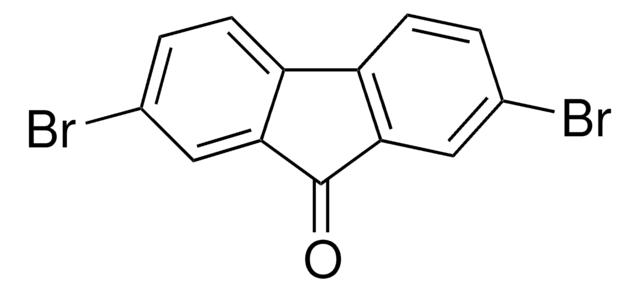
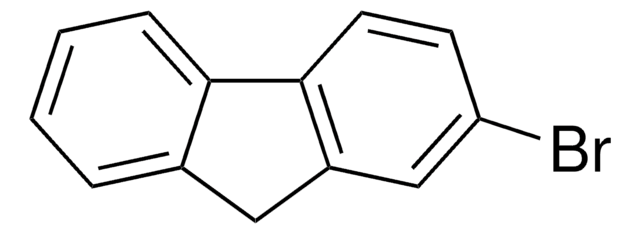
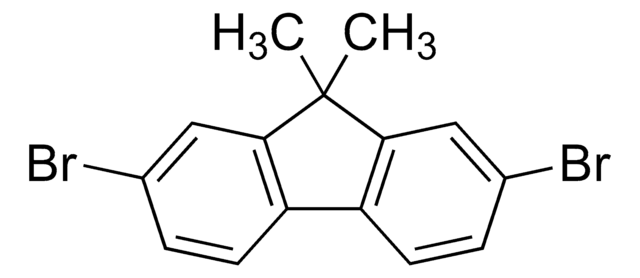



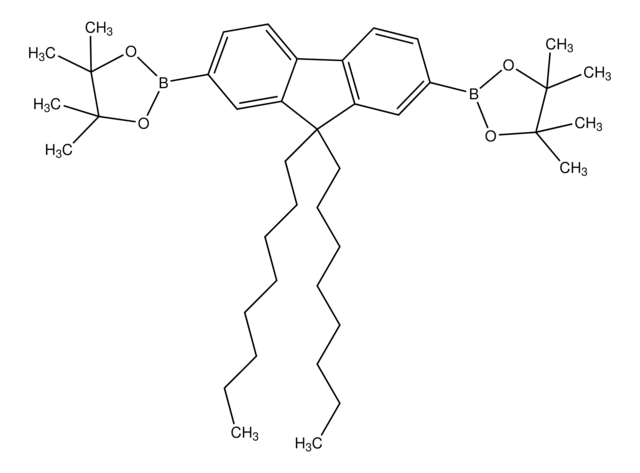
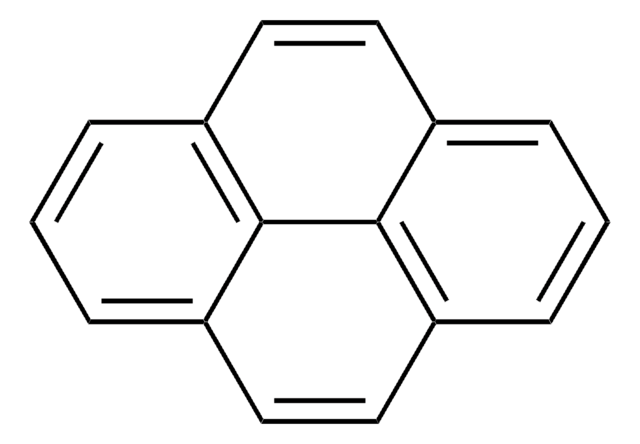
![[1,1′-bis(diphénylphosphino)ferrocène]dichloropalladium(II)](/deepweb/assets/sigmaaldrich/product/structures/130/734/8846aa26-1858-458a-998d-8c306c13bf0f/640/8846aa26-1858-458a-998d-8c306c13bf0f.png)
